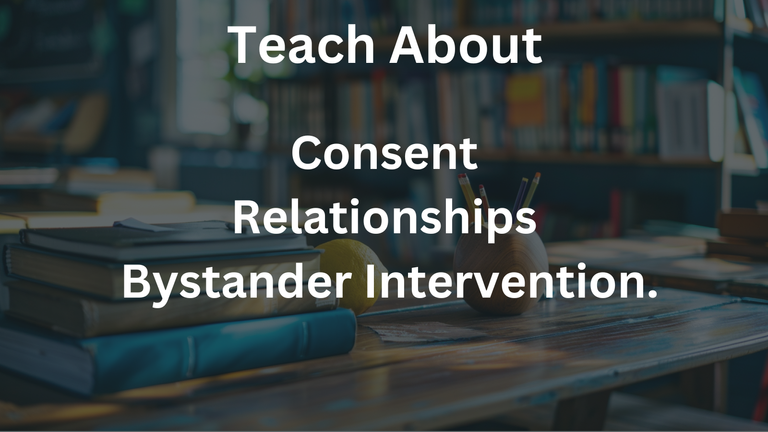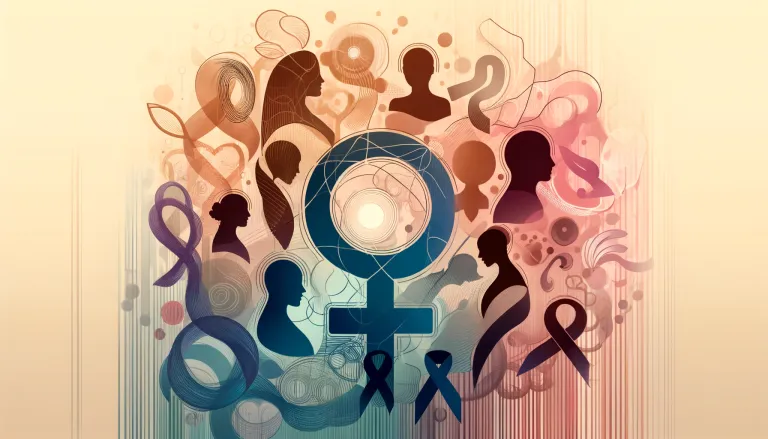Trigger Warning

Embracing Awareness and Taking Action
April is Sexual Assault Awareness Month, dedicated to raising awareness about sexual violence and promoting support for survivors, community education, and prevention efforts. For more information, visit the National Sexual Violence Resource Center (NSVRC).
Definition of Sexual Assault
Sexual assault involves non-consensual sexual activities that violate a person's autonomy. Consent should be informed, freely given, and can be withdrawn at any time. The Rape, Abuse & Incest National Network (RAINN) provides an in-depth look at consent and the various forms of sexual violence
Understanding Consent
Consent means a clear, enthusiastic, and ongoing agreement to participate in certain sexual activities. It involves communication, respect, and understanding that consent can be withdrawn at any time. RAINN's guide emphasizes the significance of consent in sexual interactions.
The Impact of Sexual Assault

Sexual assault has long-lasting effects on survivors' mental health, causing trauma, anxiety, depression, and isolation. It is important to recognize these impacts, provide empathetic support and create informed prevention strategies. The American Psychological Association offers resources on the psychological effects of trauma.
Empathy in Action: Supporting Survivors

Supporting survivors with empathy involves active listening, validating their feelings, and offering support without imposing solutions.
Here are ways to embody this approach:
- Listen Actively: Let survivors share their stories on their terms, without judgment.
- Validate Their Feelings: Acknowledge their emotions and affirm their strength in facing such profound challenges.
- Offer Support, Not Solutions: Provide resources and options, but respect their autonomy to make decisions about their healing journey.
For guidelines on how to offer empathetic support, RAINN's website is an invaluable resource (RAINN).
The Spectrum of Sexual Violence
Sexual violence is an umbrella term that covers a wide range of non-consensual sexual activities, including sexual harassment, assault, and coercion. Recognizing the broad spectrum of sexual violence is essential for offering appropriate support to survivors and for our collective prevention efforts.
The NSVRC provides insights into the various behaviors that constitute sexual violence and the significance of consent (National Sexual Violence Resource Center).
Challenging Societal Myths

Debunking myths about sexual assault, such as the belief that it's always committed by strangers, or that certain behaviors or attire invite assault. Debunking these myths is crucial for supporting survivors and fostering an informed society. RAINN offers valuable information to counter these misconceptions.
Sexual Assault Prevention
Prevention begins with education and advocacy, teaching consent from a young age, and challenging harmful stereotypes, and fostering safe environments. The National Sexual Violence Resource Center (NSVRC) offers prevention resources and strategies.
The Legal Landscape of Sexual Assault

Understanding legal definitions and ramifications is crucial for survivors seeking justice. Laws vary significantly by location, but they generally categorize sexual assault based on the severity of the act, the relationship between the perpetrator and the victim, and the specific circumstances of the assault.
The legal system's handling of sexual assault cases is complex, involving reporting procedures, investigations, and the challenges of prosecuting such cases. The National Sexual Violence Resource Center (NSVRC) and RAINN offer resources that help navigate the legal aspects of sexual assault, providing guidance for survivors on their rights and the legal avenues available to them.
The Role of Education in Prevention

Education plays an important role in preventing sexual assault. By teaching comprehensive sex education that covers topics like consent, respect, and healthy relationships, people can learn how to interact responsibly. Schools, universities, and community groups are key places for this education, where harmful beliefs can be challenged and a culture of respect can be promoted. It's also crucial to involve men and boys in conversations about consent and the need to confront sexist attitudes to change societal norms and decrease sexual violence.
Educational Programs and Workshops
Programs on healthy relationships and consent, like those by One Love, play a crucial role in prevention. Schools, workplaces, and community centers often host such programs, emphasizing the importance of early education in fostering respect and understanding.
The Importance of Self-Care for Survivors

Recovery from sexual assault is a deeply personal journey that unfolds differently for each survivor. Self-care is an essential part of healing, allowing survivors to regain a sense of control and well-being.
Self-care may include therapy, mindfulness, physical activity, creative expression, or connecting with supportive friends and family.
Organizations like RAINN provide resources on self-care strategies for survivors, emphasizing the importance of mental health and well-being in the recovery process.
The Power of Community and Solidarity

A supportive community is essential for survivors. Solidarity from friends, family, and other community members significantly impacts the healing process. A strong support network can offer a sense of belonging and understanding, helping survivors navigate the complexities of recovery.
Encouraging open dialogues about sexual assault, respecting survivors' narratives, and providing platforms for their voices helps
foster a supportive and understanding community.
Participating in events like Take Back the Night, and other community awareness efforts, strengthens the collective stand against sexual violence.
The Role of Technology in Support and Prevention

In our digital age, technology, apps and online platforms offer new avenues for education, support, and advocacy, enhancing personal safety and raising awareness.
Anonymous support for survivors, and social media campaigns raising awareness are part of this technological approach to combating sexual violence. These tools can make resources more accessible and provide a wider reach for prevention and support initiatives.
Advocating for Policy Change

Advocating for policy change is a vital aspect in the fight against sexual assault. This includes efforts to strengthen laws on sexual violence and improve support services. Engaging in advocacy efforts can lead to significant reforms.
Grassroots movements and advocacy organizations work to raise public awareness about sexual assault and lobby for changes at local, state, and federal levels.
Engaging in Advocacy and Support
Supporting survivors and engaging in prevention efforts requires action. Here are ways to get involved:
- Educate Yourself and Others: Use resources from organizations like RAINN and the NSVRC to stay informed and spread awareness.
- Support Survivors: Offer your support to survivors in your life, respecting their experiences and choices.
- Advocate for Change: Participate in advocacy campaigns, support policies that protect survivors and promote consent education.
Support Systems and Resources for Survivors

Survivors of sexual assault often need a range of support services, including medical care, legal assistance, and psychological counseling. Access to these resources can significantly affect their recovery and the pursuit of justice.
Organizations like RAINN and the NSVRC play a pivotal role in connecting survivors with local support services, hotlines, and advocacy groups. These resources are designed to meet the immediate and long-term needs of survivors, ensuring they don’t have_ _to navigate their recovery journey alone
Creating Safe Spaces

Creating safe spaces involves putting policies in place to promote safety and respect, providing training on sexual harassment prevention, and establishing clear procedures for reporting and addressing incidents of sexual violence in physical and virtual environments.
- Workplaces, schools, and online platforms all play a role in prioritizing the safety and dignity of everyone involved.
- The fight against sexual assault requires continuous education, advocacy, and support, engaging with organizations like RAINN and NSVRC year-round.
Intersectionality in Sexual Violence

Intersectionality in sexual violence means that the impact of sexual assault varies based on factors like race, gender identity, sexual orientation, and socio-economic status, which can also influence the help and resources available to survivors.
- The National LGBTQ Task Force and INCITE! Women of Color Against Violence provide resources to address these complexities, promoting a more inclusive approach to support and advocacy.
Global Perspective on Sexual Assault

WHO gives a global view on sexual violence and stresses the need for action. They provide information on sexual violence worldwide, including laws and prevention. This shows the importance of working together to tackle sexual assault and support survivors.
Advances in Legislation and Policy
Staying updated on laws and policies is important for helping survivors of sexual assault. Organizations such as the National Women's Law Center monitor legislative changes and share information on progress in supporting survivors.
Upcoming Events and Campaigns

Participation in events like Sexual Assault Awareness Month promotes learning, sharing, and action. The National Sexual Violence Resource Center (NSVRC) lists annual themes, resources, and ways to get involved in SAAM events and campaigns, fostering community engagement and awareness.
Crisis Centers and Local Support
Support is available through the National Sexual Assault Hotline and local crisis centers. Websites like RAINN provide a list of local crisis centers to offer help around the clock.
Additional Resources
Other helpful resources and support groups in the USA include RAINN (Rape, Abuse & Incest National Network) which offers a National Sexual Assault Hotline (1-800-656-HOPE) and online chat for survivors, and the National Sexual Violence Resource Center (NSVRC) which provides a directory of resources, including support groups.
Global and Online Support

The Survivors Trust in the UK offers support for survivors of rape and sexual abuse, as well as a list of UK-based support services. After Silence is an online forum where survivors can share stories and get support.
Further Reading and Resources
For those looking to deepen their understanding, the following resources offer valuable information:
- RAINN: Offers extensive resources for survivors and allies.
- NSVRC: Provides research, statistics, and training materials on sexual violence prevention and response.
- End Rape On Campus: Focuses on ending sexual violence in educational settings through advocacy and support.
Conclusion: A Unified Call to Action
Let's support survivors, challenge myths, and work towards a world without sexual violence. By learning, standing with survivors, and pushing for change, we can create a safer and more compassionate society. Get involved and help by checking out resources from RAINN and NSVRC. Your actions can make a real difference in fighting against sexual violence.
Images - Dal-E, Midjourney, Canva. I have commercial licenses.
#kindness #cwh #ecency #education #survivors #violence #kindnessmatters #wellness #pob
Hi Greg! How are you doing promoting your ideas and community?
I guess it could get a boost, and hence I am willing to donate 200 hive for a contest held for the community members. Would you mind an online call to discuss it?
Hey friend, I've been dealing with dental issues but had surgery yesterday. I'm slowly getting back to posting. Let's chat! I would love to chat.
Oh, so let's just pencil it in and get back to the topic when you recover ;) I wouldn't be much into talking just after dental surgery myself :)
I hope it helped at least :)
Yes, four teeth were removed, including a second wisdom tooth I didn't know was there! I have stitches and it's sore. When would be good for you, my friend?
Sometime next week, we'll talk about that later ;)
Sounds good